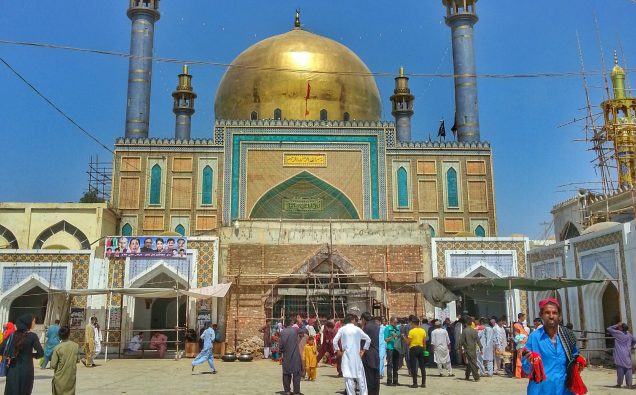
Shrine of Lal Shahbaz Qalandar, Photo by Zainab Arain via Wikimedia Commons
In one of the deadliest bombings since a sudden surge of terrorist attacks in Pakistan this week, around 50 people were killed and over 100 injured at the shrine of revered Sufi saint Lal Shahbaz Qalandar in Sehwan, Sindh, on Thursday.
According to law enforcement officials, a blast hit the compound of the shrine where a large number of devotees were performing Dhamal – a Sufi ritual of ecstatic whirling dance.
The attack in the southern Sindh province – a seat of Sufi traditions – is the seventh terrorist bombing in Pakistan in five days, with terrorist targeting all four provincial capitals and tribal areas between Pakistan and Afghanistan.
The wave of terrorist attacks in mainland Pakistan hit Lahore on Monday, when 14 persons including a Deputy Inspector General Police, were killed in a suicide bombing at a protest rally in eastern city. Terrorist also attacked places in Quetta, Karachi and Peshawar, killing a number of people during the week.
“The incident has taken place outside the mazar (shrine) where Golden Gate is located ,“ Commissioner Hyderabad Division Kazi Shahid Parvez said.
Pakistani leaders and analysts have pointed fingers at neighboring rivals India and Afghanistan, using Afghan soil, saying the two hostile countries want to offset Pakistan’s economic rise.
The attacks follow a series of international reports that rated Pakistani economy as one of the fastest growing with the potential to emerge as one of the leading powerhouses and engines of growth in a decade.
New Delhi has been explicit in opposing China Pakistan Economic Corridor and top BJP politicians including Narendra Modi and national security advisers often publicly hurl threats against Islamabad.
After the Lahore blast, Islamabad summoned an Afghan diplomat to the Foreign Ministry and handed over a note. Pakistan traced terror attacks to Jamaat ul Ahrar, which has long been hiding in Afghanistan. Jamaat ul Ahrar is an offshot of Tehreek e Taliban Pakistan, which has been fighting the Pakistani state for around a decade.
An unknown number of TTP militants fled to Afghanistan when Pakistan launched a major military operation to root out their sanctuaries in the tribal areas a couple of years.
A period of relative calm and stability followed as terrorist attacks dropped to their lowest level in a decade, raising Pakistan’s economic prospects.
At the Pakistani Foreign Ministry, Additional Secretary Tasnim Aslam raised “grave concern [Pakistan has] about the continuing terrorist attacks on Pakistani soil by the terrorist outfit Jumaat-ul-Ahrar (JuA) [operating] from its sanctuaries inside Afghanistan,” according to a statement.
Aslam reminded Afghan Deputy Head of Mission Syed Abdul Nasir Yousafi that Afghan authorities had been informed “earlier” about “actionable intelligence” where Pakistan pressed Afghanistan “to take urgent measures to eliminate the terrorists and their sanctuaries, financiers and [facilitators] operating from its territory,” the statement read
















